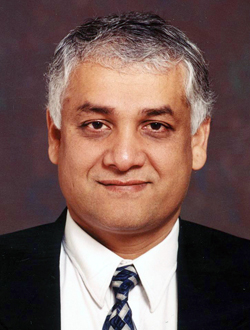Pramod P. Khargonekar

 Enlarge
Enlarge
Pramod P. Khargonekar took the reign when George Haddad stepped down in 1997. He left before his full term was completed to become Dean at the University of Florida.
Khargonekar earned his Bachelor of Technology in electrical engineering from the Indian Institute of Technology in Bombay in 1977 and his MS in mathematics and PhD in electrical engineering from the University of Florida in Gainesville in 1980 and 1981, respectively. Upon graduating, he taught at the University of Minnessota until 1989, when he came to Michigan.
A leader in control systems, he directed an AFOSR/ARPA Multidisciplinary University Research Initiative at Michigan called the Research Center on Intelligent Electronics Manufacturing: Modeling and Control of Plasma Processing. This center, which operated from 1995–2001, studied plasma processes that are used extensively in the manufacture of integrated circuits as well as active matrix liquid crystal displays.
He was named an Arthur F. Thurnau Professor for excellence in education, and the Claude E. Shannon Professor of Engineering Science in 1997.
After leaving Michigan in 2001, Khargonekar returned to his alma mater, the University of Florida, as Dean of the College of Engineering. He remained in this position until 2009, and stayed at U Florida as the Eckis Professor of Electrical and Computer Engineering. During this time, he also served as deputy director for technology at the U.S. Department of Energy’s Advanced Research Projects Agency-Energy.
From 2013-2016 he served as an assistant director for the Directorate of Engineering at the National Science Foundation. In this position, Khargonekar oversaw the Directorate’s annual budget of more than $800 million to investigate frontier engineering research and education, cultivate an innovation ecosystem, and develop the next generation of engineers.
In 2016, he was appointed vice chancellor research at the University of California, Irvine.
Khargonekar is a Fellow of IEEE and a recipient of the NSF Presidential Young Investigator Award, the American Automatic Control Council’s Donald Eckman Award, the Japan Society for Promotion of Science fellowships, the IEEE W. R. G. Baker Prize Award, the IEEE CSS George Axelby Best Paper Award, the Hugo Schuck ACC Best Paper Award, and the Distinguished Alumnus and Distinguished Service Awards from the Indian Institute of Technology, Bombay.
 MENU
MENU 
